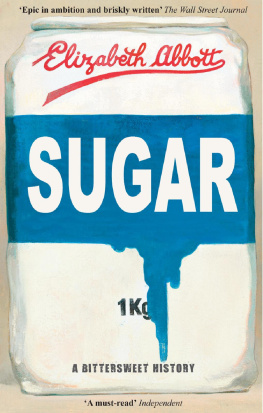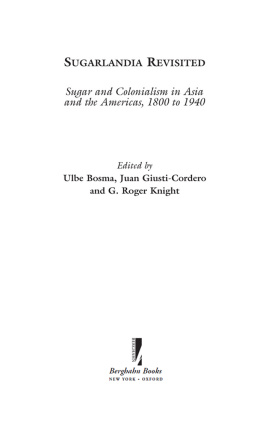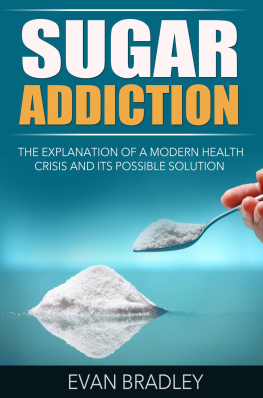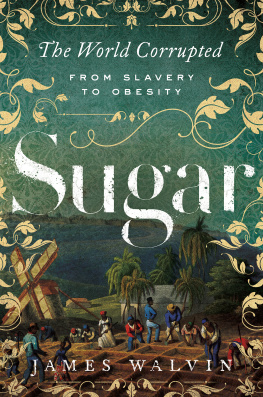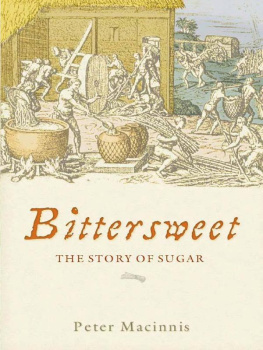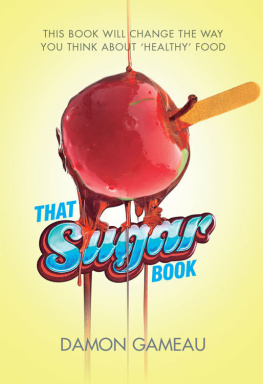SUGAR: A BITTERSWEET HISTORY
ELIZABETH ABBOTT is the former Dean of Women at Trinity College, University of Toronto, and the bestselling author of A History of Celibacy and A History of Mistresses.
Also by Elizabeth Abbott
A History of Celibacy
A History of Mistresses
SUGAR
A BITTERSWEET HISTORY
Elizabeth Abbott

Duckworth Overlook
First paperback edition 2010
This edition first published in 2009 by
Duckworth Overlook, London and New York
LONDON
Duckworth Publishers
90-93 Cowcross Street, London EC1M 6BF
Tel: 020 7490 7300 Fax: 020 7490 0080
www.ducknet.co.uk
NEW YORK
The Overlook Press
141 Wooster Street
New York, NY 10012
for bulk or special sales contact
First published in 2008 by Penguin Group (Canada)
Copyright Elizabeth Abbott, 2008
The credits on page 451 constitute an extension of
this copyright page.
All rights reserved. No part of this publication
may be reproduced, stored in a retrieval system, or
transmitted, in any form or by any means, electronic,
mechanical, photocopying, recording or otherwise,
without the prior permission of the publisher.
A catalogue record for this book is available
from the British Library
Cataloging-in-Publication Data is available
from the Library of Congress
Mobipocket ISBN: 978-0-7156-3954-2
ePub ISBN: 978-0-7156-4034-0
Adobe PDF: 978-0-7156-4035-7

For my beloved son, Ivan Gibbs:
Sugar is especially for you.
In it youll glimpse your Antiguan and Grenadian ancestors.
Contents

Acknowledgments

Sugar was a difficult book to finish. In a way, Ive been writing it all my life, and this is only one ending. During the last several years, many people have helped me through the process.
Andrea Magyar, editorial director of Penguin Canada, accepted my proposal and made my dreams come true. She and Tracy Bordian, my managing editor who took over the editorial reins, understood my need for images.
My agent, Heide Lange, has been a stalwart support in this book as in all the others. Sugar is the latest in twenty years of the best kind of collaboration.
My copy editor, Shaun Oakey, was endlessly helpful.
Stella Petrone has dedicated her life to the cane cutters of the Dominican Republic and, since we visited bateys there together, has been a constant source of encouragement and inspiration. Stella, here is my testament to the world of the cane cutters who are always foremost in your thoughts and prayers.
Rick Halpern, formerly Chair of American Studies and a professor in the Department of History and now Principal of New College at the University of Toronto, was generous in offering information and bibliographies, and welcomed me to a seminar of the Documenting Louisiana Sugar, 18451917 project. He also took time to do a critical reading of chapters 9 and 10 of the manuscript.
I am grateful to Franziska Ohnsorge, as brilliant at friendship as she is at economics, for her detailed critique and enormously helpful suggestions.
Mille mercis to the cane cutters I met in the Dominican Republic. Pask nou t bien rsvwa-mwen nou t rakont moin istwa nou. Mpap jam bli moun batey-yo kom mwen t promt nou.
Yves Pierre-Louis, my brother of the heart, youve accompanied me through another few years and another book and I love you.
Louise Abbott, my flesh-and-blood sister, commiserated, shared laughter and offered technical advice.
Steve and Bill Abbott are my rock-solid brothers, always looking out for me.
Dina Dilaveris contributed by being the most wonderful daughter-in-law a mother could hope for, our familys very own Greek goddess.
My cousin Phillip Abbott provided family reminiscences and photos and information about Antiguas (now defunct) sugar industry.
Dr. Michael Brett-Crowther, editor of the International Journal of Environmental Studies, kindly read my entire manuscript, made helpful suggestions and understood my connections to the sugar people.
Heather Conway, my dog-park buddy and friend, was always ready to work technological magic with the images that speak their thousands of words throughout this book.
My nephew Greg Abbott fed me luscious veggie stir-fries and helped out during the final stages.
Brian McKenna and Stephen Phizicky, who directed and produced the fabulous documentary Big Sugar, shared information about the Fanjuls and their Dominican bateys.
As always, my friends have been beside me and I treasure them: Margaret Gundara, Dolores Cheeks, Claire Hicks, Nina Picton, Pegi Dover, Paulette Bourgeois, Anita Shir-Jacob, Harriet Morris, Sherrill Cheda, Cathy Dunphy and Iris Nowell.
Thank you as well to Nina and Terry Picton for bringing me a copy of Suiker/Sugar from the Amsterdam Historical Museum.
As my neighbor and kindred spirit Susan Roys doctoral dissertation progressed in tandem with my book, we shared cooking duties, the stresses of deadlines and the joys of writing.
Danke to Paul Hopkirk for putting me up (and putting up with me) in Berlin when I was visiting the Zucker-Museum.
Thanks to Julia Langer, Director of the Global Threats Program, WWF, for the book on Celia Sanchez.
Thanks to Asim Ali, Anna Birnie-Lefcovitch and Edyta Rogowska for helping with research. Special thanks to Sophie Chung for those summer days hunched together over a table at Robarts Library with only sesame snaps and the joys of scholarship to sustain us.
Introduction
Once upon a time, sugarcane was known only in lands far away from the Western world. It originated in Polynesia and later spread to India, where adults and children chewed cane stalks to release their sweet sap. In China, sexually hopeful men munched it as an aphrodisiac. But in Europe, where sugarcane was unknown, people sweetened their food with the more expensive honey, which the privileged also consumed in the form of mead, an intoxicating fermented honey wine.
Centuries passed until, in the eighteenth century, an Englishwoman did something that transformed the world. Ill call her Gladys Brown. She was a farm laborers wife with a hacking cough, three rheumy children and a daily ritual. When she could snatch a few minutes from the grinding round of her daily chores, Gladys would slouch onto the bench beside her cook-fire and imbibe a soothing cup of tea. That heady brew had already addicted aristocratic Europe. But when Gladys, a woman of modest means like millions of other Europeans, popped a chunk of sugar into her cuppa, she redrew the demographic, economic, environmental, political, cultural and moral map of the world.
By sipping her sugared tea, Gladys wrenched generations of men and women from Africa and transported them across the Atlantic to slavery. She ordained the sugar agriculture of the fertile colonies of the Caribbean Sea. She rewrote the map of North America, ensuring that Dutch-held New York and French-held Canada were returned to Britain. She shaped the nature and predilections of Western cuisine, its sauces, candies, drinks, pastries and confections. She put a lollipop into the mouths of our children, and predisposed us to the obesity North Americans and Europeans now battle as an urgent health problem. She lured my ancestors from Northern Irelands County Fermagh to Antigua, where they lived and planted sugar.
Next page
